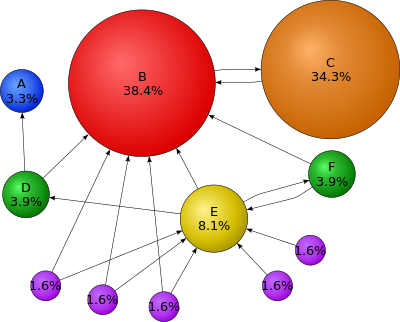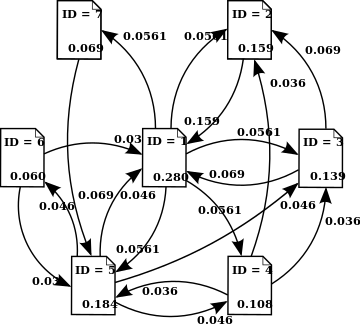ترتيب الصفحة

إن عملية بحث عن عبارة معينة باستخدام أي محرك بحث مثل جوجل تعيد عدداً كبيراً من الصفحات، مثال: البحث عن "weather forecast" يعيد 5.5 مليون صفحة، على الرغم من العدد الكبير الذي تعيده محركات البحث كرد على استعلام معين فإن الصفحات الأكثر تعلقاً بالاستعلام المطلوب ستظهر في النتائج العشرة أو العشرين الأوائل، والتي يكتفي طالب الاستعلام بالنظر إليها ويقوم بتجاهل بقية النتائج.
من الطبيعي أن تعتمد النتائج المعادة على مدى إجابة الصفحة عن الاستعلام وهنا تدخل مجموعة من العوامل في الحسبان مثل تكرار الكلمة (Occurrence) في الصفحة وتقنيات استرجاع المعلومات المستخدمة ولكن هذا ليس كل شيء، حيث أن كل صفحة تملك أهمية معينة تساهم في وضعها على رأس قائمة الصفحات المعادة من محرك البحث. يقوم محرك البحث جوجل بإسناد قيمة رقمية لكل صفحة موجودة على الوب تُظهر أهمية هذه الصفحة، وهذا الرقم يدعى ترتيب الصفحة (PageRank) والذي يحدد الترتيب الذي ستَظهر على أساسه نتائج أي استعلام ويتم حسابه بتكامل مجموعة من العوامل أهمها عدد الروابط المشيرة إلى الصفحة (Inbound links) من صفحات أخرى على الوب.
. . . . . . . . . . . . . . . . . . . . . . . . . . . . . . . . . . . . . . . . . . . . . . . . . . . . . . . . . . . . . . . . . . . . . . . . . . . . . . . . . . . . . . . . . . . . . . . . . . . . . . . . . . . . . . . . . . . . . . . . . . . . . . . . . . . . . . . . . . . . . . . . . . . . . . . . . . . . . . . . . . . . . . . .
الخوارزمية
الخوارزمية المبسطة
Assume a small universe of four web pages: A, B, C and D. The initial approximation of PageRank would be evenly divided between these four documents. Hence, each document would begin with an estimated PageRank of 0.25.
Damping factor
So any page's PageRank is derived in large part from the PageRanks of other pages. The damping factor adjusts the derived value downward. The original paper, however, gave the following formula, which has led to some confusion:
So, the equation is as follows:
where are the pages under consideration, is the set of pages that link to , is the number of outbound links on page , and N is the total number of pages.
The PageRank values are the entries of the dominant eigenvector of the modified adjacency matrix. This makes PageRank a particularly elegant metric: the eigenvector is
where R is the solution of the equation
where the adjacency function is 0 if page does not link to , and normalized such that, for each j
- ,
i.e. the elements of each column sum up to 1, so the matrix is a stochastic matrix (for more details see the computation section below). Thus the This is a variant of the eigenvector centrality measure used commonly in network analysis.
Because of the large eigengap of the modified adjacency matrix above, [1] the values of the PageRank eigenvector are fast to approximate (only a few iterations are needed).
تنويعات
Google Toolbar
- كل قيمة أعلى في الـ PageRank يكون الوصول لها أصعب من سابقتها فالوصول إلى PR6 أصعب بأربع مرات من الوصول إلى PR5.
- إضافتك لصفحات جديدة لموقعك قد يقلل من قيمة صفحات أخرى ولكن هذا التقليل لإعطاء قيمة للصفحة الجديدة.
- الروابط الداخلية الفعالة في موقعك مهمة.
- يجب أن تكون صفحات موقعك مترابطة لتسهل على عنكبوت الأرشفة أرشفة جميع الصفحات.
- من الممكن أن يطرد موقعك من قوقل إذا قمت ببعض العمليات غير المسموح بها مثل النصوص المخفية أو إيهام محرك البحث بعرض محتويات مخصصة له فقط (cloaking) أو أي عملية تخالف أنظمة قوقل.
- جوجل لايحب الصفحات الممتلئة بالروابط الخارجية خصوصا تلك التي يوجد بها أكثر من 100 رابط.
- إذا كان هناك أكثر من رابط في نفس الصفحة يؤدون إلى صفحة واحدة فستعتبر هذه الروابط كلها كرابط واحد.
- الروابط ذات النصوص الجيدة والمرتبطة بمحتوى موقعك ستضمن لك الظهور في نتائج البحث المناسبة.
- ربما تخسر بعض من قيمة الـ PageRank لموقعك إذا فقدت بعض الروابط المهمة التي تؤدي إلى موقعك أو إذا نقصت قيمة الـ PageRank للصفحات المحتوية على هذه الروابط.
- الـ PageRank واحد من عوامل عديدة تستخدمها جوجل للتعرف على ترابط وأهمية الصفحات.
- الـ meta-tag لاتأثر على قيمة الـ PageRank لكن قد يستخدمها قوقل لتوصيف موقعك في نتائج البحث وستكون نافعة إذا كانت صفحات موقعك مليئة بالجرافيكس.
- الـ PageRank لايتم حسابه للموقع كاملاً بل يتم لكل صفحة على حدى.
- إذا كانت هناك صفحة سيئة ذات PageRank منخفض بها روابط تشير إلى صفحة أخرى فان هذه الصفحة لا تتأثر بها، لن يعاقبك جوجل لأن هناك صفحات سيئة تربط بك.
- إذا قمت بإضافة “nofollow” إلى عنصر rel في الرابط فلن يدخل هذا الرابط في حساب الـ PageRank.
- إذا كان هناك رابط من صفحة إلى نفسها فانه لايؤثر في قيمة الـ.PageRank
- الـ PageRank يعتمد على الروابط القادمة للصفحة ولكن ليس عليها فقط بل يعتمد على جودتها وترابطها.
- إذا كان لديك صفحة ولنقل أن قيمة الـ PageRank لها 7 ولم يكن في هذه الصفحة سوى رابط واحد فسيستفيد هذا الرابط بشكل كبير أما ان كان في هذه الصفحة 10 روابط فسيتم توزيع قيمة الـ PageRank بينهم.
- من الممكن أن يطرد موقعك من قوقل إذا كان يضع روابطا لمواقع مطرودة لذلك تأكد دائما من المواقع التي تريد إضافتها لموقعك صداقة محركات البحث وبالأخص قوقل صاحب الشعبية الأكبر بين مستخدمي الانترنت حول العالم.
- محرك البحث جوجل يعتبر الرابط من صفحة أ إلى الصفحة ب على أنه تصويت لصالح ب.
- إضافة موقعك في دليل DMOZ لايعطيك أي أفضلية في حساب الـ PageRank ماتحصل عليه من دليل DMOZ هو نفس مايمكن أن تحصل عليه من أي صفحة أخرى لها نفس القيمة لكن ميزة DMOZ هو أن بياناته تستخدم في الكثير من المواقع الأخرى.
- محتويات الصفحة لايتم أخذها بالاعتبار عند حساب الـPageRank
- .gov وغيرها من نطاق(انترنت)النطاقات الحكومية ليس لها أي ميزة خاصة في حساب الـ PageRank ويرجع ارتفاع قيمتها غالبا لأن الروابط المؤدية إليها كثيرة والروابط الخارجة منها لمواقع أخرى قليلة.
- ارتفاع قيمة الـ PageRank لايعني ارتفاع عرض موقعك
انظر أيضاً
- EigenTrust — a decentralized PageRank algorithm
- Google bomb
- Google search
- Google matrix
- Hilltop algorithm
- Link love
- PigeonRank
- Power method — the iterative eigenvector algorithm used to calculate PageRank
- Search engine optimization
- SimRank - a measure of object-to-object similarity based on random-surfer model
- Topic-Sensitive PageRank
- TrustRank
الهامش
- ^ Taher Haveliwala and Sepandar Kamvar. (2003). "The Second Eigenvalue of the Google Matrix" (PDF). Stanford University Technical Report.
{{cite journal}}: Unknown parameter|month=ignored (help)
المصادر
- Altman, Alon; Moshe Tennenholtz (2005). "Ranking Systems: The PageRank Axioms" (PDF). Proceedings of the 6th ACM conference on Electronic commerce (EC-05). Retrieved on 2008-02-05.
- Cheng, Alice; Eric J. Friedman (2006-06-11). "Manipulability of PageRank under Sybil Strategies" (PDF). Proceedings of the First Workshop on the Economics of Networked Systems (NetEcon06). Retrieved on 2008-01-22.
- Farahat, Ayman (2006). "Authority Rankings from HITS, PageRank, and SALSA: Existence, Uniqueness, and Effect of Initialization". SIAM Journal on Scientific Computing. 27 (4): 1181–1201. doi:10.1137/S1064827502412875.
{{cite journal}}: Unknown parameter|coauthors=ignored (|author=suggested) (help) - Haveliwala, Taher; Jeh, Glen and Kamvar, Sepandar (2003). "An Analytical Comparison of Approaches to Personalizing PageRank" (PDF). Stanford University Technical Report.
- Langville, Amy N. (2003). "Survey: Deeper Inside PageRank". Internet Mathematics. 1 (3).
{{cite journal}}: Unknown parameter|coauthors=ignored (|author=suggested) (help) - Langville, Amy N. (2006). Google's PageRank and Beyond: The Science of Search Engine Rankings. Princeton University Press. ISBN 0-691-12202-4.
{{cite book}}: Unknown parameter|coauthors=ignored (|author=suggested) (help) - Page, Lawrence (1999). "The PageRank citation ranking: Bringing order to the Web".
{{cite journal}}: Cite journal requires|journal=(help); Unknown parameter|coauthors=ignored (|author=suggested) (help) - Richardson, Matthew; Domingos, Pedro (2002). "The intelligent surfer: Probabilistic combination of link and content information in PageRank" (PDF). Proceedings of Advances in Neural Information Processing Systems 14.
. . . . . . . . . . . . . . . . . . . . . . . . . . . . . . . . . . . . . . . . . . . . . . . . . . . . . . . . . . . . . . . . . . . . . . . . . . . . . . . . . . . . . . . . . . . . . . . . . . . . . . . . . . . . . . . . . . . . . . . . . . . . . . . . . . . . . . . . . . . . . . . . . . . . . . . . . . . . . . . . . . . . . . . .
وصلات خارجية
- Our Search: Google Technology by Google
- How Google Finds Your Needle in the Web's Haystack by the American Mathematical Society
- Original PageRank U.S. Patent- Method for node ranking in a linked database - September 4, 2001
- PageRank U.S. Patent - Method for scoring documents in a linked database - September 28, 2004
- PageRank U.S. Patent - Method for node ranking in a linked database - June 6, 2006
- PageRank U.S. Patent - Scoring documents in a linked database - September 11, 2007
- Scientist discovers PageRank-type algorithm from the 1940s - February 17, 2010
- Google Pagerank checker tool
